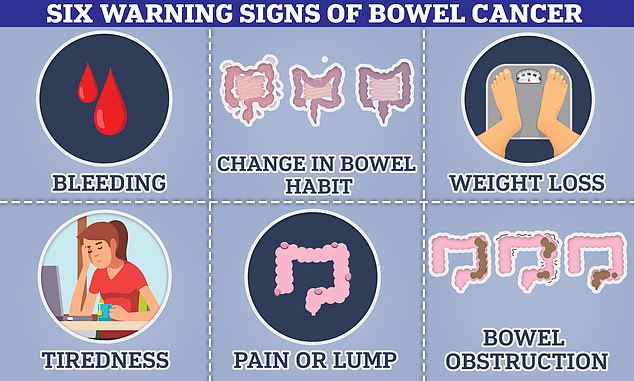A gut doctor has warned of a little-known red flag sign that can indicate deadly bowel cancer.
While it is well known that abdominal pain is a sign of the condition, gastroenterologist Dr Joseph Salhab highlighted a specific detail that the public should pay attention to.
Dr Salhab urged people to watch out for persistent abdominal pain that’s ‘localised in the same spot’ and is associated with a new bout of constipation or diarrhoea.
If the pain is bad enough to disturb your sleep, you should also see a GP, he added.
‘If it wakes you up at night because it’s so bad, these are not signs you should ignore,’ advised Dr Salhab in an Instagram video that has been viewed over 512,000 times.
Responding to a video of a 28-year-old woman whose cancer was mistaken for irritable bowel syndrome, the US-based specialist went on to list other warning signs of the deadly cancer.
‘A change in your stool caliber with thin stools or even with rectal bleeding and weight loss are not signs you should ignore,’ he added.
He also said that if the pain does not improve with dietary changes or bowel movements, this could be a red flag sign.

Dr Salhab warned of the specific symptoms that could be a red flag for colon cancer
Bleeding from the back passage, or blood in the stool, occurs when cancerous tumours bleed into the digestive tract.
Other warning signs of the cancer include a lump in the abdomen, bloating and feeling very tired or short of breath.
However, bowel cancer can also appear with no symptoms until it has spread to other areas of the body, where it becomes harder to treat.
It comes as diagnoses of the disease have sky rocketed by 80 per cent in under 50s across the globe within the last 30 years, research suggests.
In contrast, rates of the disease in older age groups, who are statistically more likely to get the disease overall, have either declined or remained stable in the same period.
Experts have suggested a host of factors are likely behind the phenomenon — from increased pollution to rising obesity and even invisible particles of plastic in drinking water.
Genetic factors are also likely to play a role, according to researchers. But diets high in ultra-processed foods, salt and alcohol and low in vitamins and minerals are the main risk factors underling the most common cancers in under-50s.
In the UK, bowel cancer is the fourth most common cancer, killing almost 17,000 people each year, with the number of young-onset cases continuing to rise.
Analysis suggests deaths from bowel cancer overall in the UK are set to rise by 2,5000 a year by 2040.
Meanwhile, the number of people in the UK diagnosed with the disease will rise by around a tenth in the same period.
A 2024 Cancer Research UK analysis of 50 countries revealed that England saw the fourth fastest annual rise in the rate of early-onset bowel cancer in the decade to 2017, faster than any other country in Europe.
This article was originally published by a www.dailymail.co.uk . Read the Original article here. .

